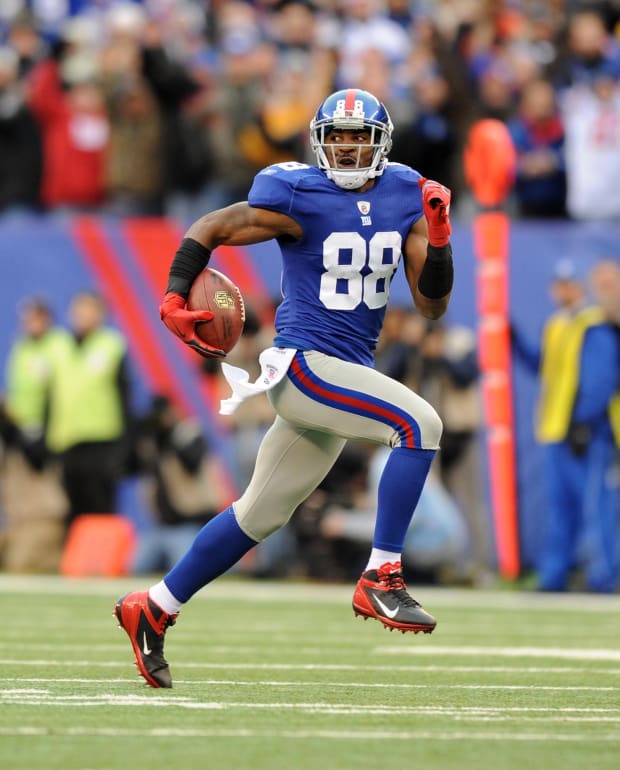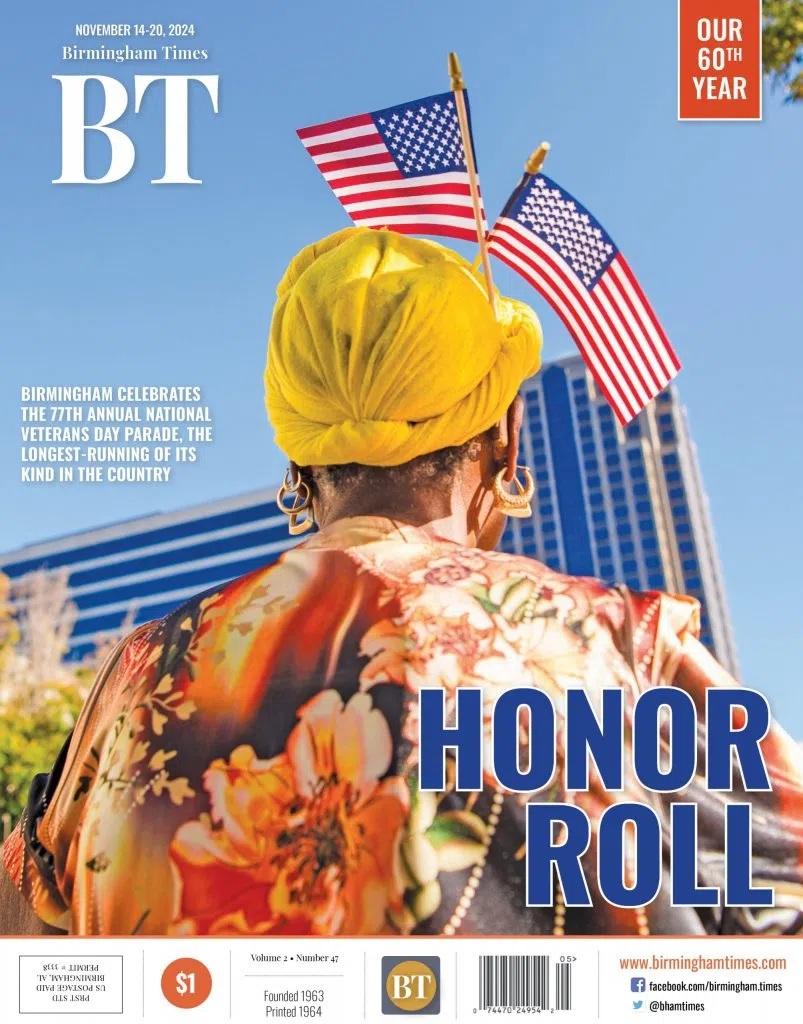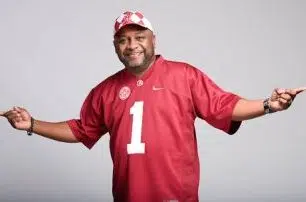The Giants have had some excellent wide receivers in their long NFL history. Here is a ranking of the team’s 10 best wide receivers, along with some other talented Giants players who deserve honorable mention at this position.
Who Are the Greatest Wide Receivers in Giants History?
The Giants have had their share of great wide receivers. As a longtime fan, I’ve enjoyed watching many of the best in team history, and as a student of Giants history, I’ve come to appreciate many wide receivers from the earlier years of the franchise too.
To take one simple measure of success, 10 Giants wide receivers have tallied more than 1,000 receiving yards in a season. Seven of those players have accomplished the feat more than once, led by Amani Toomer, who did it in five consecutive seasons. In the 2011 season, two Giants players, Victor Cruz and Hakeem Nicks, both had more than 1,000 receiving yards.
Most of the 24 seasons in which the Giants have had at least one wide receiver with more than 1,000 yards have been in the 21st century. This isn’t surprising, as modern NFL players are often stronger, faster and better conditioned than players of earlier eras. Changes in the game itself have also contributed to the frequency with which new milestones are set. So it’s not always easy to do an apples-to-apples comparison of players from different eras and rank their achievements.
Selection and Ranking Criteria for This List
Although it may not be easy, it’s always fun to rank a team’s best players. So here’s my list of the 10 greatest wide receivers in Giants history (including those designated as flankers or split ends), followed by a list of several others who deserve honorable mention. These are my criteria:
- Length of Career With the Giants: How many seasons did the player play for the Giants? This ranking includes only wide receivers who were on the team for a minimum of four seasons.
- Individual Performance Statistics and Achievements: I compared the players’ receiving statistics, including total receiving yardage, yards per reception, touchdowns and more. I looked at career totals as well as performances in individual seasons and sometimes in particular games. For players whose careers included time with other teams besides the Giants, I considered only their years with the Giants.
- Recognition and Awards: Was the player selected for the Pro Bowl or named a first-team All-Pro? Did he win an MVP award or recognition as Player of the Month or Player of the Week? Is he in the Hall of Fame or the Giants Ring of Honor? Has his jersey been retired?
- Team Success: A top wide receiver can be a big part of a team’s success, so I also looked at how well the Giants did as a team during a player’s tenure. Did the team make the playoffs or win a championship? Of course, it’s also common for a great player to be surrounded by a mediocre team, so I didn’t consider this criterion as strongly as the others.
Even so, my ranking is still somewhat subjective, and you may not agree with my choices. Whether or not you do, I hope you enjoy the list!
10. Ike Hilliard
Giants Career at a Glance
- Years with the team: 1997–2004 (eight years of his 12-year NFL career)
- Jersey number: 88
- Playoff appearance: 2000
Recap of Hilliard’s Giants Career
The Giants drafted Ike Hilliard with the seventh pick in the first round of the 1997 NFL Draft. He had been named a consensus All-American at the University of Florida, which won the 1997 Sugar Bowl for its first national title during his junior year.
Hilliard’s promising start with the Giants was derailed in the second game of his rookie season. After completing a 23-yard reception, he suffered a serious neck injury and was out for the rest of the season. Coming back in 1998, he caught 51 passes for 715 yards, second-most on the team.
Hilliard’s best season statistically was 1999, when he came up just short of a 1,000-yard season with 72 receptions for 996 yards. In 2000, he caught 55 passes for 787 yards and led the team in touchdowns with eight, helping the Giants win the NFC East title. In the Giants’ 41–0 rout of the Vikings in the NFC championship game, Hilliard turned in a superb performance with 10 receptions for 155 yards and two touchdowns.
Hilliard had 100 or more receiving yards in eight regular-season games with the Giants. He was the team’s leading receiver in 23 regular-season games and two postseason games. Hilliard never led the team in single-season receiving yardage, but he came in second in four of his eight seasons. He finished his Giants career with 4,630 receiving yards and 27 touchdowns.
Ike Hilliard’s Receiving Stats With the Giants

9. Hakeem Nicks
Giants Career at a Glance
- Years with the team: 2009–2013, 2015 (six years of his seven-year NFL career)
- Jersey number: 88
- Playoff appearance: 2011
- Super Bowl Championship: Super Bowl XLVI
Recap of Nicks’s Giants Career
The Giants drafted Hakeem Nicks out of the University of North Carolina with the 29th pick in the first round of the 2009 NFL Draft.
Nicks had a very successful rookie season. He was named the NFL Offensive Rookie of the Month for October, when he caught 14 passes for 297 yards and scored a touchdown in each of the Giants’ four games. For the season, he had 47 receptions for 790 receiving yards with six touchdowns.
Nicks started the 2010 season with a bang, scoring three touchdowns in the Giants’ season-opening win over the Panthers. He went on to lead the team in receiving yardage for the season with 1,052 yards on 79 receptions. His 11 touchdown catches were fourth-best in the league.
In 2011, Nicks had his second consecutive season with 1,000+ receiving yards, catching 76 passes for 1,192 yards and seven touchdowns. He was especially prolific in the Giants’ surprising playoff run, setting several franchise records for a single postseason with 28 receptions for 444 yards and four touchdowns. With 109 of those yards coming in Super Bowl XLVI, he was the leading receiver in the Giants’ 21–17 win over the Patriots.
Nicks had one of the best games of his career in Week 2 of the 2012 season, catching 10 passes for 199 yards and one touchdown in the Giants’ win over the Buccaneers. In recognition of his performance, he was selected as the NFC Offensive Player of the Week.
For the 2012 and 2013 seasons, Nicks had the second-most receiving yards on the team with 692 and 896 yards, respectively. His Giants contract expired after the 2013 season, and he played for the Colts for one year before returning to the Giants midway through the 2015 season, when he saw limited action in six games. For his Giants career, Nicks had 318 receptions for 4,676 yards with 27 touchdowns.
Hakeem Nicks’s Statistics With the Giants
8. Chris Calloway
Giants Career at a Glance
- Years with the team: 1992–1998 (seven years of his 11-year NFL career)
- Jersey number: 80
- Playoff appearances: 1993, 1997
Recap of Calloway’s Giants Career
Chris Calloway was a wide receiver for a University of Michigan team that won two Big Ten Conference championships and won the 1989 Rose Bowl. The Steelers drafted him in the fourth round of the 1990 NFL Draft. After two seasons with the Steelers, the Giants signed him as a free agent in March 1992.
Calloway went on to play in every game for the Giants for seven years. He led the team in receiving yardage for the first time in Week 15 of the 1992 season, and he caught his first touchdown pass as a Giant the following week.
By 1994, Calloway was a regular starter. In four consecutive seasons from 1995 to 1998, he led the team in receiving yardage. Beginning with the second game of the 1996 season and continuing through the entire 1997 and 1998 seasons, he had at least one reception in 47 straight games, setting a franchise record.
Statistically, Calloway’s best season was 1997. He led the Giants with 58 receptions, 849 receiving yards and eight touchdown passes.
The highlight of Calloway’s season came in the Giants’ Week 8 overtime win over the Lions. He led the team with 145 receiving yards and scored the winning touchdown in overtime on a 68-yard reception from Danny Kanell. Calloway’s performance earned him the award as the NFC Offensive Player of the Week.
During his Giants career, Calloway was the team’s leading receiver in 41 games, the second-most in Giants history. When his Giants tenure ended after the 1998 season, Calloway’s 334 receptions were the third-most in franchise history, and he was fifth in all-time receiving yardage with 4,710 yards.
Chris Calloway’s Statistics With the Giants
7. Plaxico Burress
Giants Career at a Glance
- Years with the team: 2005–2008 (four years of his 11-year NFL career)
- Jersey number: 17
- Playoff appearances: 2005, 2006, 2007
- Super Bowl Championship: Super Bowl XLII
Recap of Burress’s Giants Career
Plaxico Burress signed with the Giants in March 2005 after playing for five years with the Steelers. Pittsburgh had drafted him with the eighth pick in the 2000 NFL Draft after his record-setting college football career at Michigan State University.
In his first season with the Giants, Burress was the team’s leading receiver with 76 receptions for 1,214 yards and seven touchdowns. An early highlight of the season came in the Giants’ Week 4 win over the Rams, as Burress caught 10 passes for 204 yards with two touchdowns. The receiving yardage total was his highest single-game total with the Giants. He was named the NFC Offensive Player of the Week for his performance.
In 2006, Burress scored a team-high 10 touchdowns and again led the team in receiving yardage, falling just short of a 1,000-yard season with 988 yards on 63 receptions.
Burress was the Giants’ leading receiver for the third consecutive season in 2007, despite not practicing for much of the season because of an ankle injury. He had 70 receptions for 1,025 yards and 12 TDs during the regular season. In the Giants’ NFC championship game win over the Packers, he set a franchise record with 11 catches, for 154 yards.
The highlight of the season—both for Burress and for the Giants—came in the final minute of Super Bowl XLII. With the Giants down 14–10 to the undefeated Patriots, Burress caught a 13-yard touchdown pass from Eli Manning with 35 seconds left to cap a thrilling win for the Giants.
Burress’s 2008 season was disappointing. After missing preseason practice time due to a contract dispute, he then violated team rules by missing practice in September, resulting in a one-game suspension. His last appearance with the Giants came on November 23. On November 28, he injured himself in an accidental shooting at a New York nightclub. The Giants suspended him for the remainder of the season and released him in April 2009.
Burress was a very talented and productive receiver. In 57 regular-season games over four seasons with the Giants, he had 244 receptions for 3,681 yards and 33 touchdowns. In 27 of those games, he led the Giants in receiving yardage. If his Giants career had been longer, Burress would probably be higher on my list.
Plaxico Burress’s Statistics With the Giants

6. Victor Cruz
Giants Career at a Glance
- Years with the team: 2010–2014, 2016 (his entire six-year NFL career)
- Jersey number: 80
- Playoff appearances: 2011, 2016
- Super Bowl Championship: Super Bowl XLVI
- Pro Bowl selection: 2012
- NFL season leader: longest reception (2011)
Recap of Cruz’s Giants Career
Victor Cruz had a solid college football career at the University of Massachusetts, but he went undrafted in the 2010 NFL Draft. The Giants signed him as a free agent after the draft.
He made the Giants’ roster after an outstanding 2010 preseason, but he played in only three games in the regular season before suffering a hamstring injury in mid-October. The Giants put him on the injured reserve list, and he missed the rest of the season.
Cruz came back with a vengeance in 2011 with one of the most remarkable seasons by a wide receiver in Giants history. He began the season as the team’s fourth wide receiver, but after Domenik Hixon went down with a season-ending ACL injury in Week 2, Cruz stepped up. In Week 3, he led the Giants with 110 receiving yards and two touchdowns as they beat the Eagles. It was the first of 10 games in the regular season in which Cruz led the team in receiving yardage and the first of seven in which he had 100 or more receiving yards.
Cruz played a huge role in the Giants’ last two regular-season games, propelling them into the playoffs. In their Week 16 win over the Jets, he caught three passes for 164 yards. His 99-yard touchdown reception in the second quarter included 89 yards after the catch. The play changed the momentum of the game and the season. The following week, in the Giants’ must-win game against the Cowboys, Cruz had 178 receiving yards in the Giants’ 31–14 win that clinched the NFC East.
Cruz set a Giants franchise record with 1,536 receiving yards for the season. Hakeem Nicks also had more than 1,000 receiving yards, making 2011 the only season in Giants history in which two wide receivers reached that milestone. Cruz continued his outstanding play in the Giants’ playoff run, contributing 269 yards on 21 receptions, including a touchdown catch in the Giants’ Super Bowl XLVI win over the Patriots.
Cruz had a second consecutive season with 1,000+ yards in 2012 and just missed a third with 998 yards in 2013. He was named to the Pro Bowl in 2012.
After suffering a torn tendon injury in the sixth game of the 2014 season, Cruz missed the remainder of the season and all of the 2015 season. He came back in 2016 as the Giants’ third wide receiver option and had 586 yards for the season. He did not play in 2017 and retired in 2018.
Despite missing many games due to injuries, Cruz finished his Giants career with 4,549 receiving yards and 25 touchdowns. His 99-yard touchdown reception in 2011 is the longest in Giants history.
Victor Cruz’s Statistics With the Giants
5. Del Shofner
Shofner’s Giants Career at a Glance
- Years with the team: 1961–1967 (seven years of his 11-year NFL career)
- Jersey number: 85
- Playoff appearances: 1961, 1962, 1963
- Pro Bowl selections: 1961, 1962, 1963
- First-Team All-Pros: 1961, 1962, 1963
Recap of Shofner’s Giants Career
Del Shofner was the first Giant to have more than 1,000 receiving yards in a season. In fact, he accomplished the feat three times, in each of his first three seasons with the Giants, beginning in 1961.
After playing college football at Baylor University, Shofner was drafted by the Rams in the first round of the 1957 NFL Draft. He played for the Rams for four seasons, both as a receiver and a punter. He led the NFL in receiving yardage in 1958.
In late August 1961, the Giants obtained Shofner from the Rams in a trade for their 1962 first-round draft choice. Earlier that month, the Giants had acquired veteran quarterback Y.A. Tittle in a trade with the 49ers. The combination of Tittle and Shofner revitalized the Giants’ offense.
In the 1961 season, Shofner caught 68 passes for 1,125 yards and 11 touchdowns. In 1962, he tallied 1,133 yards on only 53 catches—an average of 21.4 yards per reception—and scored 12 touchdowns. In 1963, he had 64 receptions, including nine for touchdowns, for a total of 1,181 yards. Shofner’s receiving yardage totals put him in the NFL’s top five for each of those years.
From 1961 to 1963, Shofner had 13 games with 100 or more receiving yards. He turned in one of the best performances in franchise history in Week 7 of 1962. After missing one game due to a severe shoulder injury (that probably should have kept him out longer), Shofner caught 11 passes for 269 yards with one touchdown to help the team beat Washington.
Shofner was named a First-Team All-Pro and selected for the Pro Bowl in each of those first three seasons with the Giants. Moreover, his individual success as a receiver (usually lined up as a split end) coincided with successful seasons for the Giants. They won the Eastern Conference all three years but lost in the NFL championship game each time.
Injuries caught up with Shofner beginning in 1964, limiting his playing time and hampering his effectiveness. He lost his job as the starting split end midway through the 1965 season. Although he continued to play through the 1967 season, his numbers were never again comparable to those from 1961 to 1963.
When Shofner retired after the 1967 season, he was the Giants’ No. 4 all-time career receptions leader with 239 catches and their No. 3 all-time career leader in receiving yardage with 4,315 yards.
Del Shofner’s Statistics With the Giants

4. Odell Beckham Jr.
Giants Career at a Glance
- Years with the team: 2014–2018 (the first five years of his NFL career)
- Jersey number: 13
- Playoff appearance: 2016
- Pro Bowl selections: 2014, 2015, 2016
- NFL season leader: yards per game (2014), yards per touch (2016)
- Awards and honors: NFL All-Rookie Team (2014), NFL AP Offensive Rookie of the Year (2014)
Recap of Beckham’s Giants Career
Excelling at LSU as both a wide receiver and a return specialist, Odell Beckham Jr. won the 2013 Paul Hornung Award as the most versatile player in major college football. When he entered the 2014 NFL Draft after his junior season, the Giants drafted him with the 12th pick in the first round.
Beckham missed the first four games of his rookie season due to a hamstring injury, but once he saw action, he made a huge impact. He scored a touchdown against the Falcons in his first game, and he really broke out in November, with 38 receptions, 593 receiving yards and two touchdowns. Against the Cowboys on November 23, Beckham opened the second quarter with an acrobatic one-handed TD catch of a 43-yard pass from Eli Manning. The catch was immediately hailed as one of the greatest in NFL history.
Beckham continued his impressive performance throughout the entire 2014 season. He set several Giants rookie records along the way, including the longest-ever touchdown reception by a rookie, with an 80-yard catch against the Rams, and the most receiving yards in a game, with 185 against the Eagles. He finished his rookie season with 91 catches for 1,305 yards and 12 touchdowns—all Giants rookie records. He put these numbers together in only 12 games, leading the NFL for that season in average yards per game with 108.8. He made the Pro Bowl and the NFL All-Rookie Team and was named the NFL AP Offensive Rookie of the Year.
Beckham had even better numbers in 2015. Beginning in Week 8, he put together six consecutive games with 100+ receiving yards. For the season, he caught 96 passes for 1,450 yards. He had 13 touchdown receptions, which tied the Giants record set by Homer Jones in 1967. He was again named to the Pro Bowl. In the Giants’ Week 14 game against the Panthers, Beckham was involved in several altercations and received three personal foul penalties for unnecessary roughness (including a helmet-to-helmet collision with another player). The NFL suspended him for one game—the fourth time he had been fined or suspended at that point in his career.
In 2016, Beckham played in all 16 games of the season for the first time. He finished the season with a career-high 101 receptions, for 1,367 yards and 10 touchdowns. In the Week 3 game against Washington, Beckham’s 30th NFL game, he had seven receptions for 121 yards. His first reception of the game gave him 200 for his career, and he broke 3,000 receiving yards in the same game; Beckham achieved both milestones faster than any other player in NFL history. He was selected for the Pro Bowl for the third consecutive season.
In 2017, Beckham fractured his ankle in the Giants’ Week 5 loss to the Chargers and was out for the rest of the season. However, he came back in 2018 to record 1,000+ receiving yards for the fourth time in his career, despite missing the last four games of the season with a quad injury. In addition to his 2018 receiving accomplishments, Beckham threw two touchdown passes.
In March 2019, the Giants traded Beckham to the Browns. Despite being a Giant for only five seasons and playing in only 59 games, Beckham’s career numbers put him among the team’s all-time receiving greats. He holds the Giants record for most games with 100+ receiving yards with 24 and is second in receiving yardage with 5,476 yards, fourth in receptions with 390 and fourth in receiving touchdowns with 44.
Odell Beckham’s Statistics With the Giants
3. Homer Jones
Giants Career at a Glance
- Years with the team: 1964–1969 (six years of his seven-year NFL career)
- Jersey number: 45
- Pro Bowl selections: 1967, 1968
- NFL season leader: longest reception (1965), receiving touchdowns, combined rushing and receiving touchdowns (1967)
Recap of Jones’s Giants Career
After playing college football at Texas Southern College, Homer Jones was drafted by the Houston Oilers in the fifth round of the 1963 AFL Draft. But the Oilers cut him after he suffered a knee injury in training camp.
The Giants drafted him in the 20th round of the NFL Draft the same year. They paid to bring him to New York for knee surgery. After rehabbing his knee, he got into three games in the 1964 season and caught four passes for 82 yards.
Jones also saw limited action in the first few games of the 1965 season, but after catching a 34-yard pass in Week 4, he got a start against the Eagles the following week when Del Shofner was out with an injury. He made the most of the opportunity. In the second quarter of the Giants’ win, he caught an 89-yard touchdown pass from Earl Morrall to give the Giants a lead that they wouldn’t relinquish. It was the longest touchdown reception in Giants history to that point and the longest reception that season in the NFL.
Jones went on from there to lead the Giants in receiving for the season with 26 receptions for 709 yards, for an outstanding 27.3 average yards per catch.
In the Giants’ 1966 opener against the Steelers, Jones caught only two passes. But both were touchdowns, and both were long—a 75-yarder in the first quarter and a 98-yarder in the fourth—giving Jones 173 receiving yards for the game. For the season, he had 1,044 receiving yards, marking the first of three consecutive seasons with 1,000+ receiving yards.
In 1967, Jones scored 13 receiving touchdowns, tops in the NFL that season and a Giants franchise record that still stands. (Odell Beckham tied it in 2015.) He also had 1,209 receiving yards. It was the first time a Giants receiver went over the 1,200-yard mark, and it would be the last for 35 years. Jones was chosen for the 1967 and 1968 Pro Bowls.
The Giants traded him to the Browns after the 1969 season. He played for Cleveland for one season before retiring.
Jones finished his Giants career with 214 receptions for 4,845 yards and 35 touchdowns. At the time, his receiving yardage was second-best in franchise history. He remains the Giants’ all-time leader in yards per reception (based on a minimum of 200 receptions), with a 22.64 average. His slightly lower overall career average of 22.26 is the best in NFL history.
Homer Jones’s Statistics With the Giants
2. Kyle Rote
Giants Career at a Glance
- Years with the team: 1951–1961 (his entire 11-year NFL career)
- Jersey number: 44
- Playoff appearances: 1956, 1958, 1959, 1961
- NFL Championship: 1956
- Pro Bowl selections: 1953, 1954, 1955, 1956
Recap of Rote’s Giants Career
The Giants drafted Kyle Rote with the first pick in the 1951 NFL Draft after his standout collegiate career as a running back at SMU. In 1950, Rote was a consensus All-America selection and the runner-up for the Heisman Trophy.
Rote began his Giants career as a running back, but a knee injury forced him to switch positions and become a receiver. Despite his diminished speed, he excelled at his new position, where his great moves and instincts served him well. He led the Giants in receiving yardage in 1953 for the first of three consecutive seasons (edging out Bob Schnelker by one yard in 1954).
In 1956, Rote teamed with other stars like fellow Pro Bowlers Rosey Brown, Charlie Conerly and Frank Gifford on offense and Rosey Grier, Andy Robustelli and Emlen Tunnell on defense to help the Giants win the NFL championship. Rote caught a touchdown pass in the championship game as the Giants beat the Bears 47–7. The Giants reached the NFL championship game three more times during Rote’s career, although they didn’t win it again.
Rote’s most productive years as a receiver were the final two seasons of his career. In 1960, he led the Giants with 42 receptions for 750 yards and 10 touchdowns. In the 1961 season, he contributed 805 yards, second to Del Shofner.
Rote was one of the most popular Giants among both the fans and his teammates. He was a Giants captain for 10 of his 11 seasons, and numerous teammates reportedly paid him the high compliment of naming children after him.
When Rote retired after the 1961 season, he held numerous Giants receiving records; he was the franchise’s career leader in receptions with 300, receiving yardage with 4,797 yards and touchdown receptions with 48.
Kyle Rote’s Statistics With the Giants
1. Amani Toomer
Giants Career at a Glance
- Years with the team: 1996–2008 (his entire 13-year NFL career)
- Jersey numbers: 89 (1996–1997), 81 (1998–2008)
- Playoff appearances: 1997, 2000, 2002, 2005, 2007, 2008
- Super Bowl Championship: Super Bowl XLII
- Awards and honors: Giants Ring of Honor (2010)
Recap of Toomer’s Giants Career
Amani Toomer finished his college football career at the University of Michigan ranked second of all time in receiving yards, despite being a starter for only one of his four seasons. The Giants drafted him with the 34th pick in the second round of the 1996 NFL Draft.
The Giants used Toomer primarily as a kickoff and punt return specialist for his first three seasons. In his first NFL game, the Giants’ 1996 opener against the Bills, Toomer returned a punt 87 yards for a touchdown, setting a Giants record. He was named the NFC Special Teams Player of the Week for Week 8 of the 1997 season when he returned five punts for 78 yards, including a 53-yard return for a touchdown against the Lions.
Toomer continued to see most of his playing time as a return specialist in 1997 and 1998, but he also started to get some opportunities as a receiver. He caught his first NFL touchdown pass in the Giants’ win over the Cardinals in Week 12 of the 1997 season. In 1998, he had 27 receptions for 360 yards and scored five receiving touchdowns.
In 1999, Toomer started all of the Giants’ games as a wide receiver. He had 1,183 receiving yards for the season, which at the time was the second-highest total in Giants history, and he set a then Giants record with 79 receptions. He also recorded more than 1,000 receiving yards in five consecutive seasons with the team—an unprecedented and so far unequaled franchise streak.
His best season statistically was 2002, when he caught 82 passes for 1,343 yards, with eight touchdowns. In Week 2 of 2003, Toomer had 126 receiving yards against the Cowboys and surpassed Frank Gifford’s all-time Giants career receiving yardage record.
Toomer had numerous other outstanding performances. He was awarded the game ball after his 204-yard, three-touchdown game against the Colts in Week 16 of the 2002 season. One of the touchdowns came on an 82-yard catch, which was the longest reception of his career. When the Giants beat the Jets in Week 9 of the 2003 season, Toomer was named the NFC Offensive Player of the Week after recording 127 yards, including a 39-yard touchdown reception.
In the 2004 season, Toomer’s streak of 1,000-yard seasons came to an end, and he failed to score a touchdown for the first time since his rookie season. But even after Plaxico Burress emerged as the Giant’s number-one receiver in 2005, Toomer continued to be a force on the team’s offense. When the Giants beat the Falcons in Week 6 of the 2007 season, Toomer had seven receptions for 89 yards and a touchdown. The seventh catch was the 587th of his career, which broke Tiki Barber’s Giants record for most receptions. The touchdown catch tied him with Kyle Rote on the Giants’ all-time list. He passed Rote with another touchdown the following week.
Toomer was a member of six Giants playoff teams, including two that went to the Super Bowl. In the Giants’ Super Bowl XLII win over the Patriots, Toomer led New York with six receptions and 84 receiving yards.
Toomer retired from the Giants with 668 receptions, 9,497 receiving yards and 54 receiving touchdowns. All were and still are Giants franchise records—just several of the many Toomer holds. There can be no doubt that Amani Toomer is the No. 1 Giants wide receiver of all time.
Amani Toomer’s Statistics With the Giants
Honorable Mentions
Besides the top 10 wide receivers that I’ve listed, the Giants have had other standout players at this position (including split ends and flankers) over the years. Here are my choices for honorable mention, listed in alphabetical order.
Frank Gifford
- Years with the team: 1952–1960, 1962–1964 (his entire 12-year NFL career)
- Jersey number: 16
- Playoff appearances: 1956, 1958, 1959, 1962, 1963
- NFL Championship: 1956
- Pro Bowl selections: 1953–1959, 1963
- First-Team All-Pros: 1955–1957, 1959
- NFL season leader: total yards from scrimmage (1956)
- Career receiving: 367 receptions for 5,434 yards, 43 touchdowns
- Awards and honors: UPI NFL Most Valuable Player Award (1956), Newspaper Ent. Assoc. NFL Most Valuable Player Award (1956), UPI Comeback Player of the Year (1962), Professional Football Hall of Fame (1977), Giants jersey number 16 retired (2000), Giants Ring of Honor (2010)
Hall of Famer Frank Gifford was one of the greatest Giants of all time. He spent most of his career as a running back, until a devastating head injury in Week 9 of the 1960 season forced him to retire after the season. After sitting out the entire 1961 season, he returned as a flanker in 1962.
He played so well as a receiver that United Press International (UPI) named him the Comeback Player of the Year in 1962, and he made the Pro Bowl in 1963 for the eighth time in his career. When he retired, Gifford was the Giants’ all-time career leader in receptions and receiving yardage and was second in receiving touchdowns.
Earnest Gray
- Years with the team: 1979–1984 (the first six years of his seven-year NFL career)
- Jersey number: 83
- Playoff appearances: 1981, 1984
- Career receiving: 243 receptions for 3,768 yards with 27 touchdowns
- Awards and honors: 1979 NFL All-Rookie Team
Gray led the Giants in receiving yardage in 1979, his rookie year, with 537 yards. In 1980, he was the Giants’ leader in receptions with 52, receiving yards with 777 and touchdown receptions with 10. But his best year was 1983, when he had 78 receptions, 1,139 receiving yards and five TD catches, again leading the Giants in all three stats for the season. Gray was the first Giants receiver to record 1,000+ yards since Homer Jones did it in 1968.
Lionel Manuel
- Years with the team: 1984–1990 (his entire seven-year NFL career)
- Jersey number: 86
- Playoff appearances: 1984, 1985, 1986, 1989
- Super Bowl Championship: Super Bowl XXI
- Career receiving: 232 receptions for 3,941 yards, 23 touchdowns
Manuel was a top receiver for the Giants in the 1980s. His best year was 1988, when he was the Giants’ leading receiver with 65 receptions and 1,029 yards. He also led the Giants in receiving yards in 1985 and 1989.
Joe Morrison
- Years with the team: 1959–1972 (his entire 14-year NFL career)
- Jersey number: 40
- Playoff appearances: 1959, 1961, 1962, 1963
- Career receiving: 395 receptions for 4,993 yards, 47 touchdowns
- Awards and honors: Giants jersey number 40 retired (1972), Giants Ring of Honor (2010)
Nicknamed “Old Dependable,” the versatile Morrison played six positions, including flanker, during his long Giants career. He had his best season as a receiver in 1966, with 46 receptions for 724 yards and six touchdowns. When he retired, he was the Giants’ all-time career leader in receptions and was second in receiving yards.
Steve Smith
- Years with the team: 2007–2010 (four years of his six-year NFL career)
- Jersey number: 12
- Playoff appearances: 2007, 2008
- Super Bowl Championship: Super Bowl XLII
- Pro Bowl selection: 2009
- Giants career receiving: 220 receptions for 2,386 yards, 11 touchdowns
Smith had a short but prolific career with the Giants. He first made a name for himself in the 2007 playoffs, catching 14 passes for 152 yards. In the Giants’ Super Bowl XLII win over the Patriots, he had four third-down catches resulting in first downs. Smith made the Pro Bowl in 2009, when he led the Giants with 107 receptions, 1,220 receiving yards and seven receiving touchdowns.
Final Thoughts on This Ranking
This ranking of the Giants’ all-time best wide receivers is certainly not definitive. I think that Amani Toomer is the obvious choice for the No. 1 spot, but after that, reasonable minds may differ.
If you’re a Giants fan, you probably have your own favorite players. You might also think that other criteria should be used to rank the top wide receivers in franchise history. Debates about listing some players instead of others or about the order of the ranking are likely.
You’re welcome to disagree with my choices, especially if I’ve omitted one of your favorite wide receivers or ranked a player higher or lower than you think he deserves. In fact, I hope you do. Differing opinions are a big part of what makes football fun.






































